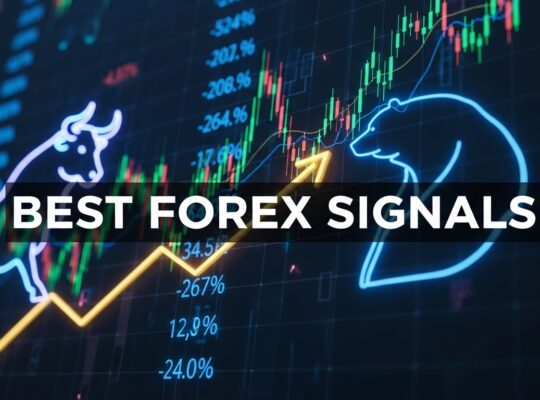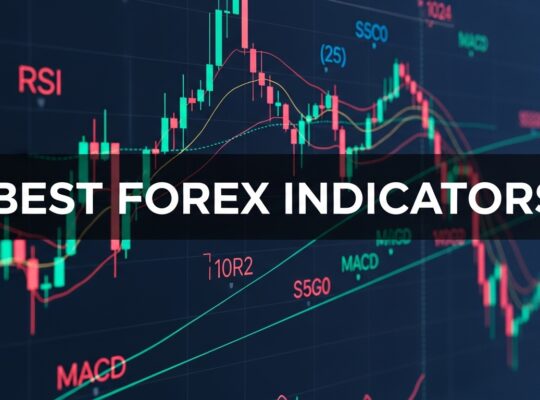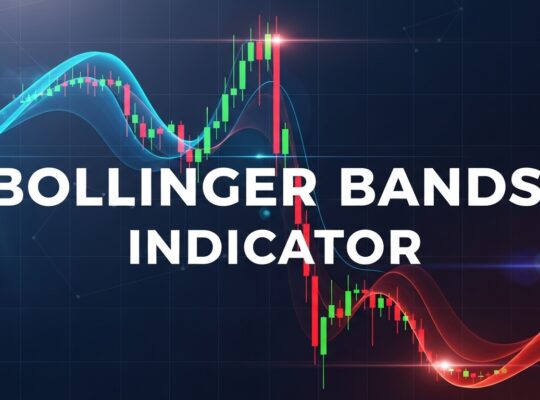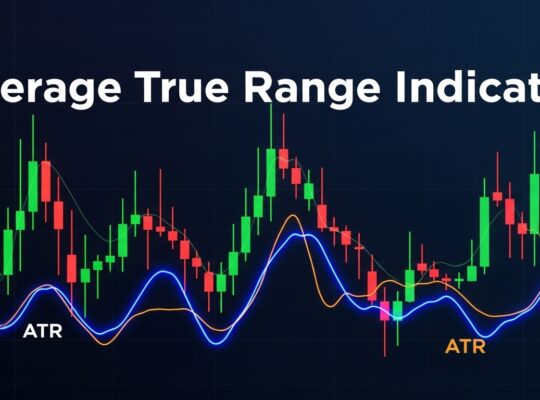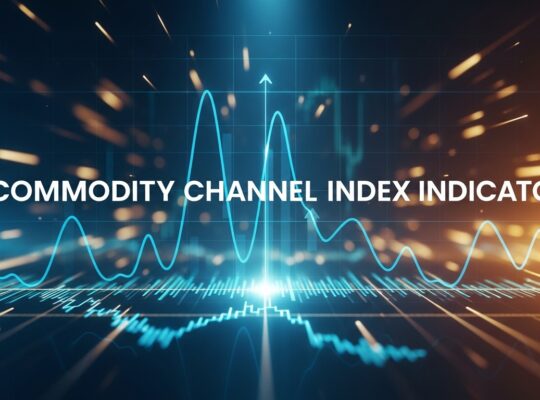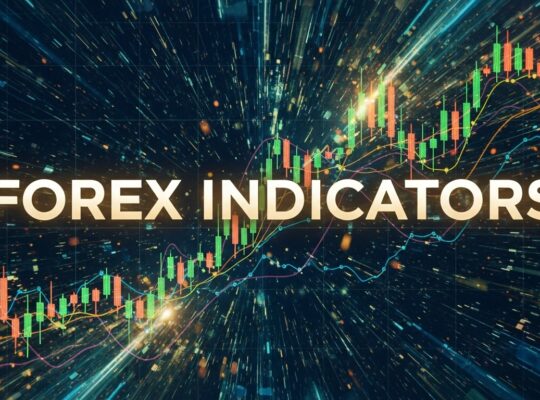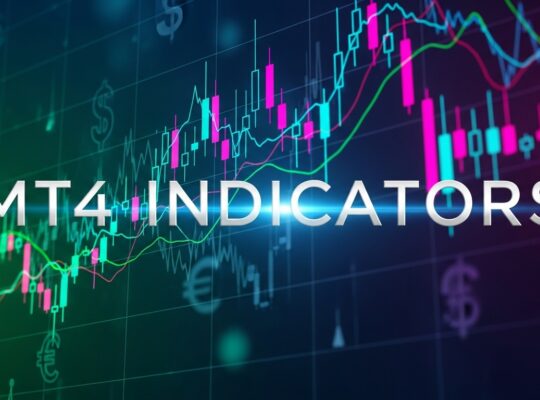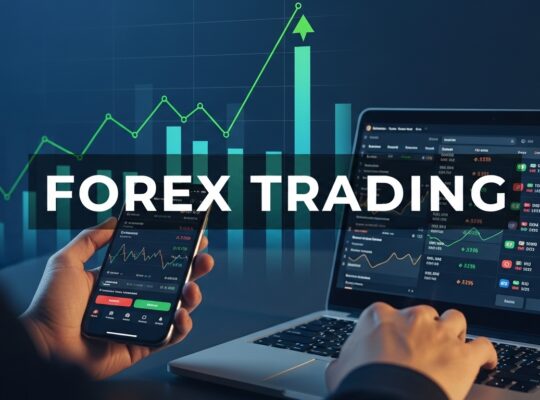Your choice of forex broker will fundamentally shape every aspect of your trading experience. The difference between a top-tier broker and a mediocre one can mean the difference between consistent profitability and frustrating losses, not due to market movements, but due to poor execution, excessive costs, or unreliable platforms. The best forex brokers offer tight spreads, lightning-fast execution, robust regulatory protection, and comprehensive trading tools that can give you a genuine edge in the markets.
We’ve analyzed everything from execution quality during major news events to customer service response times. This comprehensive review process has revealed clear winners and exposed brokers that fall short of professional standards.
Whether you’re a complete beginner looking for educational support and user-friendly platforms, or a seasoned professional requiring institutional-grade execution and advanced tools, this guide will help you identify the best forex brokers for your specific needs. We’ll share our unbiased rankings, explain what makes certain brokers stand out from the competition, and provide the insights you need to make an informed decision that could significantly impact your trading success.
How We Evaluated the Best Forex Brokers
Our evaluation methodology goes far beyond reading marketing materials or checking advertised spreads. We opened live accounts with each broker, deposited real money, and conducted extensive testing over a six-month period that covered various market conditions, including high-volatility events, quiet trading sessions, and major economic announcements.
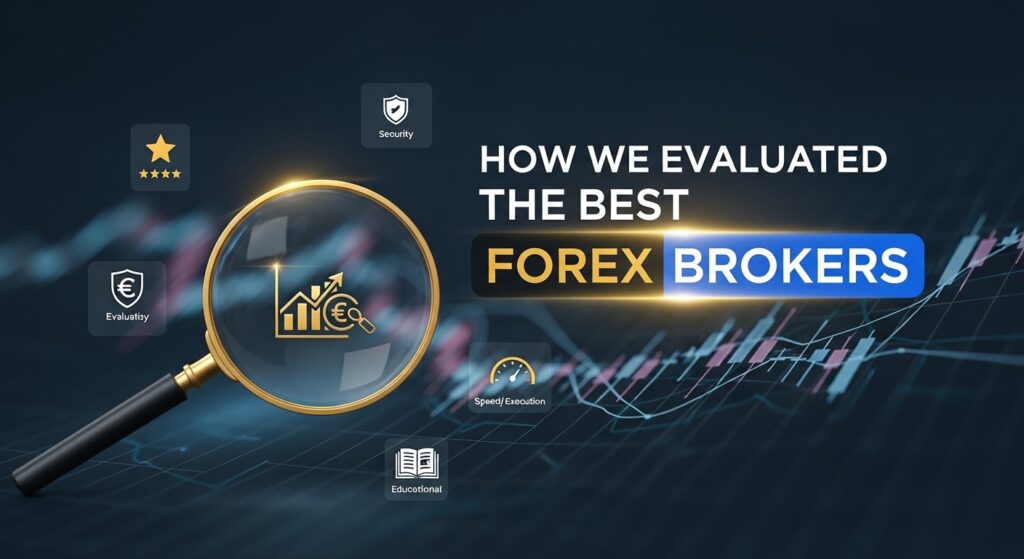
Our testing process began with regulatory verification through official government databases rather than relying on broker claims. We confirmed licensing status with regulatory bodies including the Financial Conduct Authority in the UK, the Australian Securities and Investments Commission, the Cyprus Securities and Exchange Commission, and other tier-one regulators. Only brokers with solid regulatory foundations made it to our detailed testing phase.
We evaluated trading costs by calculating total expenses across different trading scenarios. Rather than simply comparing advertised spreads, we measured actual spreads during various market conditions, including the critical periods around news releases when many brokers widen spreads significantly. We also factored in commissions, overnight financing charges, and any hidden fees that could impact long-term profitability.
Platform performance received intensive scrutiny through both automated testing and manual evaluation. We measured order execution speeds, tested platform stability during volatile market conditions, and evaluated the quality of mobile applications. Our team placed hundreds of test trades to assess slippage, requoting frequency, and overall execution quality.
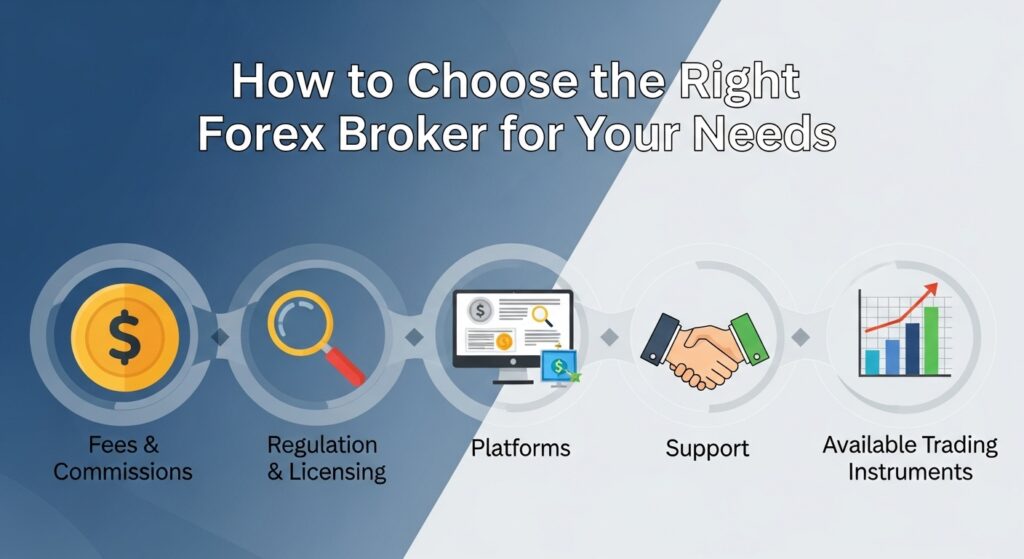
Customer service evaluation involved testing response times, knowledge levels, and problem-resolution capabilities across different communication channels. We submitted both simple and complex inquiries during various hours to understand the true quality and availability of support services. The results revealed dramatic differences between brokers in this critical area.
Top 5 Best Forex Brokers Overall
After comprehensive testing and analysis, five brokers have distinguished themselves as the best options for serious forex traders. These platforms offer exceptional combinations of competitive costs, reliable execution, strong regulation, and comprehensive features that serve both novice and experienced traders effectively.

IG Group leads our rankings as the best overall forex broker for 2025, earning a 9.4/10 rating through consistent excellence across all evaluation criteria. Regulated by the FCA in the UK and multiple other tier-one authorities, IG provides institutional-grade trading conditions with EUR/USD spreads starting from 0.6 pips and exceptional execution quality. Their proprietary platform offers advanced charting capabilities, while MetaTrader 4 support ensures compatibility with automated trading strategies. What sets IG apart is their comprehensive market coverage, offering over 80 currency pairs plus thousands of additional instruments including stocks, indices, and commodities. Professional account options provide enhanced leverage and tighter spreads for qualifying traders, while their extensive educational resources make them equally suitable for beginners.
OANDA secures second place with a 9.2/10 rating, particularly excelling in execution quality and transparency. This US and UK regulated broker has built a reputation for reliable pricing and excellent customer service over more than 25 years in the market. OANDA’s fractional pip pricing provides more precise spreads, often resulting in better effective costs than competitors. Their award-winning mobile platform delivers exceptional functionality, making them ideal for traders who need reliable access while away from their desks. The broker’s commitment to transparency includes publishing detailed execution statistics, allowing traders to verify the quality of their service independently.
Pepperstone ranks third with a 9.0/10 rating, earning recognition as one of the fastest-growing brokers due to their focus on execution speed and competitive pricing. Regulated by ASIC in Australia and the FCA in the UK, Pepperstone offers some of the tightest spreads available, with EUR/USD spreads as low as 0.0 pips on their Razor account plus a small commission. Their cTrader platform provides exceptional order management capabilities and transparent market depth information. Pepperstone particularly excels for scalping and high-frequency trading strategies, with execution speeds that consistently outperform competitors during our testing.
Interactive Brokers claims fourth position with an 8.9/10 rating, standing out as the best choice for professional traders and those requiring extensive market access. While their platform has a steeper learning curve, Interactive Brokers offers unmatched asset diversity, including direct access to global stock exchanges alongside competitive forex spreads. Their tiered pricing structure benefits high-volume traders, and their advanced risk management tools are particularly valuable for sophisticated trading strategies. The broker’s institutional background shows in their robust infrastructure and comprehensive reporting capabilities.
XTB rounds out our top five with an 8.7/10 rating, offering an excellent balance of user-friendly design and professional features. This Polish broker, regulated across multiple European jurisdictions, has gained recognition for their intuitive xStation platform and comprehensive educational resources. XTB provides competitive spreads without commissions on standard accounts, making cost calculation straightforward for traders. Their market analysis and educational content rival that of much larger brokers, while their customer service consistently receives high marks from users.
Best Forex Brokers by Category
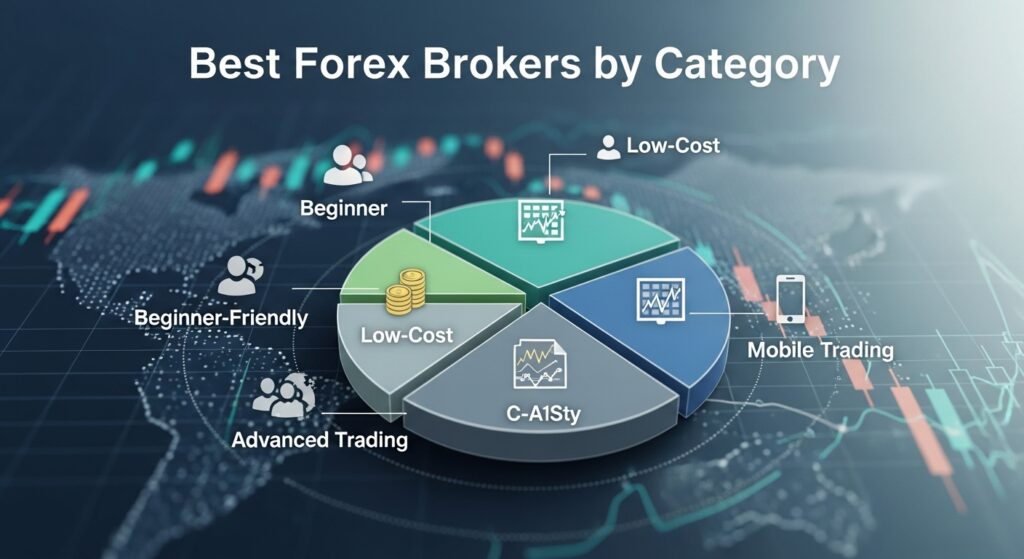
Best Forex Brokers for Beginners
Beginning traders need more than just low costs and tight spreads. They require comprehensive educational resources, user-friendly platforms, and excellent customer support to navigate the learning curve successfully. Our testing revealed three brokers that consistently excel at supporting new traders through their forex education journey.

eToro takes the top spot for beginners by combining social trading capabilities with extensive educational resources and a genuinely intuitive platform. Their CopyTrader feature allows beginners to automatically replicate the trades of successful traders, providing both learning opportunities and potential profits while gaining experience. The platform’s social features create a community environment where new traders can ask questions and learn from more experienced participants. eToro’s educational content covers everything from basic forex concepts to advanced trading strategies, with regular webinars and market analysis sessions.
Plus500 excels as a beginner-friendly option through their simplified trading interface and comprehensive risk management tools. The platform strips away complexity without sacrificing functionality, making it easy for new traders to understand their positions and manage risk effectively. Their demo account provides unlimited practice time with real market conditions, and the transition to live trading is seamless. Plus500’s customer education focuses on risk awareness and responsible trading practices, crucial foundations for long-term success.
FXCM rounds out our beginner recommendations with their DailyFX educational platform and comprehensive onboarding process. FXCM provides structured learning paths that guide new traders from basic concepts through advanced strategies systematically. Their Trading Station platform offers both simplicity for beginners and advanced features that traders can access as their skills develop. The broker’s commitment to trader education shows in their extensive library of articles, videos, and interactive courses.
Best Forex Brokers for Professional Traders
Professional traders require institutional-grade execution, advanced trading tools, and competitive conditions that can handle large position sizes and high-frequency strategies. Our analysis identified brokers that consistently deliver the performance and features that serious traders demand.

Interactive Brokers leads in professional trading capabilities through their direct market access, advanced order types, and comprehensive portfolio management tools. Professional traders benefit from their tiered pricing structure, which reduces costs significantly for high-volume trading. The Trader Workstation platform provides institutional-grade analytics, risk management, and execution capabilities that rival those available to hedge funds and proprietary trading firms.
Pepperstone excels for professional scalping and high-frequency strategies due to their exceptional execution speeds and transparent ECN pricing. Their cTrader platform provides Level II pricing information and advanced order management capabilities essential for professional strategies. The broker’s VPS hosting services ensure minimal latency for automated trading systems, while their API access enables custom trading applications.
IG Group serves professional traders through their L2 Dealer platform and professional account classifications. Qualified professional traders receive enhanced leverage, institutional spreads, and priority execution. Their comprehensive market coverage allows professionals to implement sophisticated hedging strategies across multiple asset classes using a single account.
Best Low-Cost Forex Brokers
Trading costs can significantly impact profitability, particularly for active traders or those working with smaller accounts. Our cost analysis identified brokers that genuinely offer the most competitive trading conditions without compromising on essential services.
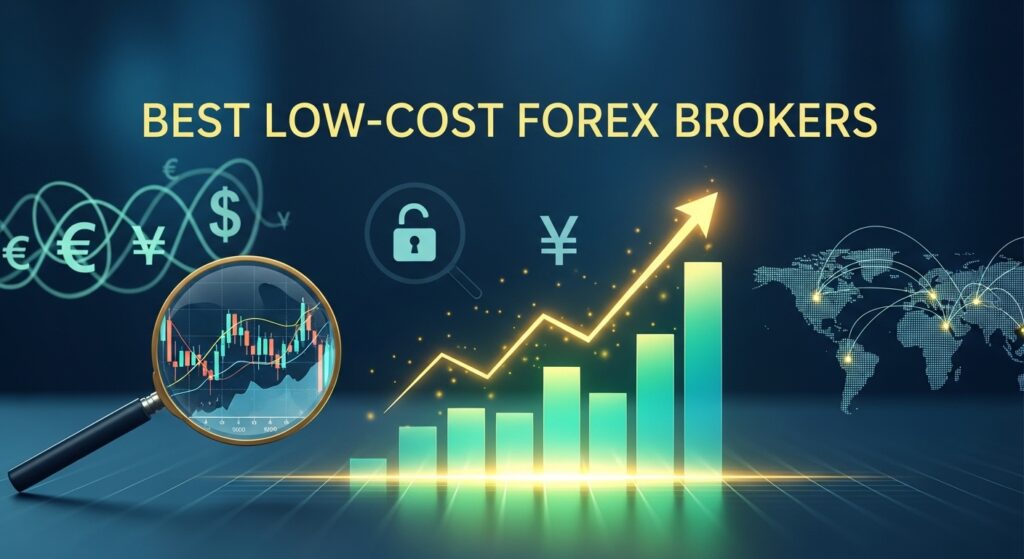
IC Markets leads in cost efficiency with their Raw Spread account offering spreads from 0.0 pips plus competitive commissions starting at $3.50 per lot. Their ECN pricing model ensures transparent costs, while their MetaTrader integration provides familiar trading environments. During our testing, IC Markets consistently delivered the advertised spreads even during volatile market conditions.
Pepperstone’s Razor account provides exceptional value for cost-conscious traders who don’t mind paying small commissions in exchange for ultra-tight spreads. Their commission structure scales with volume, providing better rates for more active traders. The broker’s commitment to transparent pricing means no hidden fees or unexpected charges.
FP Markets offers compelling value through their RAW account with competitive spreads and reasonable commission structures. Their diverse platform offerings, including MetaTrader and cTrader integration, provide flexibility without additional costs. FP Markets particularly excels in providing consistent pricing across different market sessions.
Regional Best Forex Brokers
Regulatory environments and local preferences significantly influence which brokers can serve traders in different regions effectively. Understanding regional considerations helps ensure you choose a broker that can provide optimal service in your location.

Best Forex Brokers for US Traders
The US regulatory environment, governed by the CFTC and NFA, creates unique constraints that limit available brokers but ensure high levels of consumer protection. US traders must work with domestically regulated brokers, which limits leverage to 50:1 for major pairs and 20:1 for minor pairs but provides SIPC insurance protection and strict oversight.
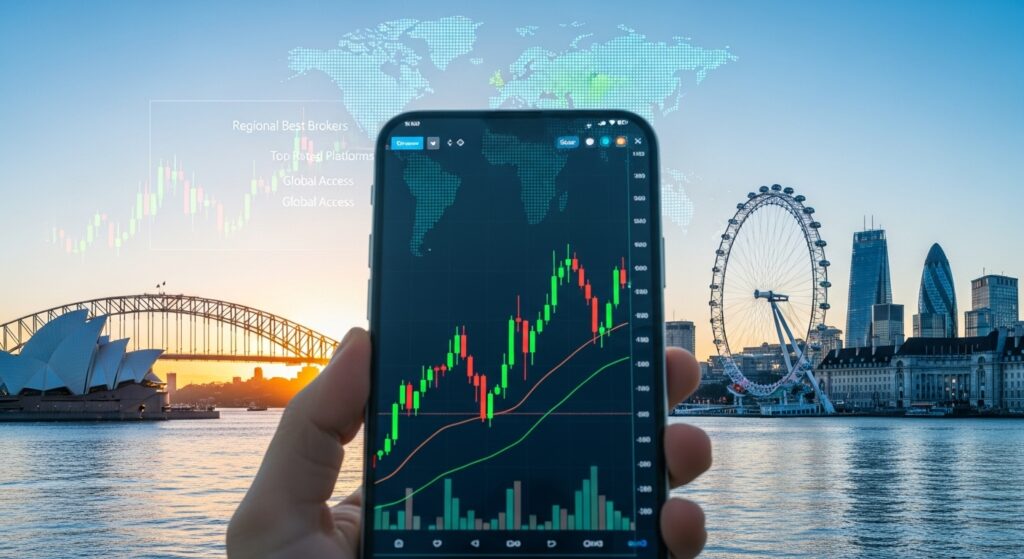
OANDA leads for US traders through their comprehensive regulatory compliance and exceptional customer service. Their US operations are fully CFTC regulated, and they provide the transparency and reliability that American traders expect. OANDA’s fractional pip pricing often results in better effective spreads than competitors, while their educational resources and market analysis provide significant value for US-based traders.
FOREX.com serves US traders effectively with competitive spreads, robust platforms, and comprehensive market coverage. Their long-standing presence in the US market demonstrates their commitment to regulatory compliance and customer service. The broker’s advanced charting capabilities and market analysis provide valuable tools for traders operating under US regulatory constraints.
Best Forex Brokers for European Traders
European traders operate under ESMA regulations that limit leverage to 30:1 for major pairs and provide negative balance protection. However, traders classified as professionals can access enhanced conditions similar to those available in other jurisdictions.

IG Group dominates the European market through their FCA regulation and comprehensive service offerings. European traders benefit from IG’s extensive market coverage, advanced platforms, and excellent customer service in multiple languages. Their professional account classification process allows qualified traders to access enhanced leverage and institutional-grade conditions.
XTB excels for European traders particularly in Central and Eastern European markets where they maintain strong local presence. Their xStation platform provides excellent functionality while their educational resources are available in multiple European languages. XTB’s regulatory status across multiple EU jurisdictions ensures consistent service regardless of location.
Best Forex Brokers for Asian Traders
Asian traders often prefer brokers with strong regional presence, local language support, and favorable trading hours for Asian market sessions. Several brokers have established themselves as leaders in serving Asian markets effectively.

Pepperstone has built strong presence in Asia particularly in Australia and Southeast Asian markets. Their ASIC regulation provides excellent protection for regional traders while their platform’s performance during Asian trading hours consistently outperforms competitors. Pepperstone’s customer service operates effectively across Asian time zones.
IC Markets serves Asian traders exceptionally well through their Australian regulation and regional focus. Their MetaTrader platforms perform excellently during Asian sessions, while their customer service and educational resources cater specifically to Asian market preferences.
Detailed Broker Comparisons
Understanding the specific differences between top brokers helps you make informed decisions based on your individual trading requirements. Our detailed analysis reveals how these brokers perform across critical factors that impact your trading success.

When comparing trading costs across our top-ranked brokers, significant differences emerge depending on your trading style and volume. For scalpers executing dozens of trades daily, commission-based brokers like Pepperstone and IC Markets often provide better value despite the per-trade fees, as their spreads remain consistently tight during volatile periods. Swing traders holding positions for days or weeks might find spread-based brokers like IG Group more cost-effective, as they avoid commission charges while overnight financing rates remain competitive.
Platform comparison reveals distinct advantages depending on your technical requirements and trading style. MetaTrader 4 remains the most popular choice due to its extensive customization options and Expert Advisor support, with brokers like IC Markets and Pepperstone providing excellent MT4 implementations. However, proprietary platforms often offer superior integration with broker services, as seen with IG’s advanced charting capabilities and OANDA’s superior mobile experience.
Execution quality varies significantly between brokers, particularly during high-impact news events and volatile market conditions. Our testing revealed that ECN brokers like Pepperstone and IC Markets consistently deliver better execution during these critical periods, while market makers like IG Group provide more predictable spreads but may experience temporary widening during extreme volatility.
Customer service quality creates substantial differences in overall trading experience, particularly when technical issues arise or account problems need resolution. OANDA consistently provided the most knowledgeable and responsive support, while IG Group excelled in multilingual support capabilities. Smaller brokers sometimes struggle with response times during peak hours, highlighting the importance of this often-overlooked factor.
Broker Selection Guide
Matching the right broker to your specific trading style and requirements requires careful consideration of your priorities, experience level, and long-term goals. The broker that works perfectly for a scalping strategy may be entirely unsuitable for long-term position trading, while beginners have fundamentally different needs compared to experienced professionals.
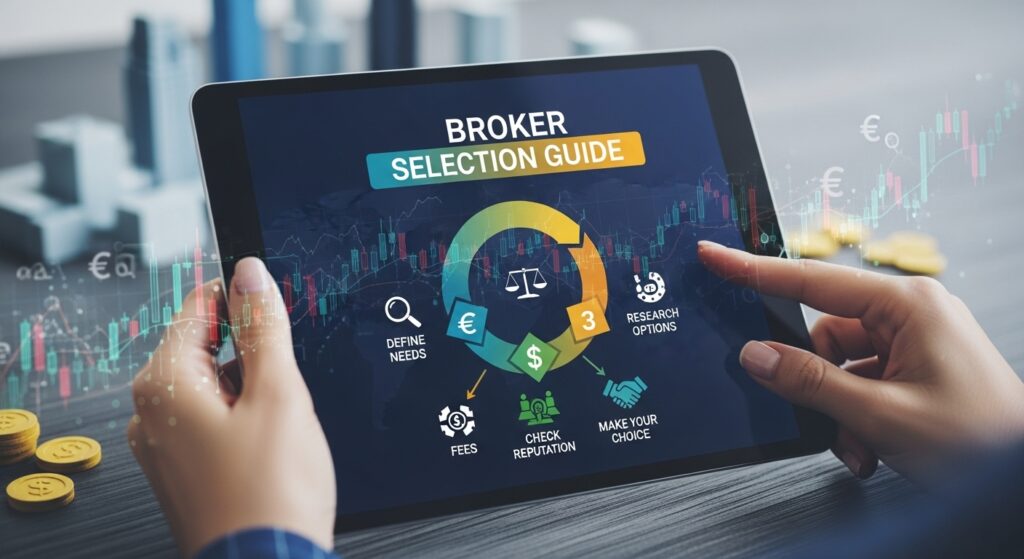
Scalpers and high-frequency traders should prioritize execution speed and minimal costs per trade above most other factors. Commission-based ECN brokers typically provide the best conditions for these strategies, as their transparent pricing models and direct market access minimize slippage and requoting. Platform stability becomes critically important, as any downtime during active trading can result in significant missed opportunities or inability to manage risk effectively.
Day traders require a balance between competitive costs and comprehensive platform features. Real-time news feeds, economic calendars, and advanced charting capabilities become essential tools for identifying and capitalizing on intraday opportunities. Platform reliability remains crucial, but slightly higher costs may be acceptable in exchange for superior research tools and market analysis.
Swing traders and position traders can focus more on research capabilities, overnight financing rates, and long-term platform reliability rather than execution speed and minimal spreads. Educational resources, market analysis, and comprehensive asset coverage often provide more value than saving a few pips on spreads for traders holding positions over longer time frames.
Account size considerations significantly influence broker selection, as different brokers cater to different account tiers more effectively. Traders with accounts under $1,000 should prioritize brokers offering micro lots, competitive minimum trade sizes, and educational resources over institutional-grade features they cannot yet utilize effectively. Conversely, traders with larger accounts should focus on brokers providing professional account classifications, institutional spreads, and advanced risk management tools.
Risk management capabilities vary significantly between brokers and should align with your trading approach and experience level. Beginners benefit from brokers offering comprehensive risk warnings, negative balance protection, and educational content about risk management. Experienced traders might prefer brokers providing advanced order types, portfolio margin capabilities, and sophisticated hedging tools.
Getting Started with Your Chosen Broker
Successfully transitioning from broker selection to active trading requires careful preparation and systematic approach to account setup and platform familiarization. The initial steps you take with your new broker can significantly impact your long-term trading success and relationship quality.

The account opening process has become increasingly streamlined across most reputable brokers, typically requiring 24 to 72 hours for complete verification and approval. Prepare necessary documentation in advance, including government-issued identification, proof of address, and income verification for larger accounts. High-resolution digital copies expedite the process and reduce the likelihood of document rejection requiring resubmission.
Initial deposit strategies should balance your desire to access better account tiers with prudent risk management. While larger deposits often unlock better spreads and additional features, never deposit more than you can afford to lose completely. Consider starting with the minimum required for your desired account type, then increasing your deposit as you gain experience and confidence with the platform.
Demo account utilization should focus on platform familiarization rather than strategy testing, as demo conditions often differ from live trading environments. Use demo accounts to understand order placement procedures, explore platform features, and test customer service responsiveness. However, transition to live trading with small positions as soon as you’re comfortable with the platform, as the psychological aspects of trading with real money cannot be replicated in demo environments.
Platform setup and customization can significantly improve your trading efficiency and decision-making capabilities. Invest time in organizing your workspace, setting up relevant market watch lists, and configuring alerts for important price levels or news events. Many traders underutilize their platform’s capabilities, missing opportunities to automate routine tasks and improve their overall trading experience.
Risk management implementation should be your first priority when beginning live trading. Configure appropriate stop-loss levels, position sizing algorithms, and maximum daily loss limits before placing your first trade. Many brokers offer risk management tools that can help automate these critical processes, reducing the likelihood of emotional decision-making during stressful market conditions.
Common Mistakes to Avoid
Trader errors in broker selection often stem from focusing on the wrong factors or falling victim to aggressive marketing tactics that emphasize short-term benefits over long-term trading success. Understanding and avoiding these common pitfalls can save you significant money and frustration while improving your overall trading experience.
Bonus-focused decision making represents one of the most costly mistakes new traders make when selecting brokers. While 100% deposit bonuses or free trading credits sound attractive, they typically come with restrictive terms that make the bonus value illusory. Common restrictions include minimum trading volume requirements that force overtrading, time limitations that pressure hasty decisions, and withdrawal restrictions that essentially lock your money into the platform. Focus on fundamental broker qualities like regulation, execution quality, and reasonable costs rather than promotional offers that may never provide real value.
Regulation status negligence can expose you to significant risks that far outweigh any potential benefits from choosing unregulated brokers. Unregulated brokers may offer attractive trading conditions, higher leverage, or lower costs, but they provide no meaningful protection if problems arise. Without regulatory oversight, these brokers can engage in practices like price manipulation, refuse withdrawal requests, or simply disappear with client funds. The minor cost savings never justify the existential risks to your trading capital.
Platform testing neglect leads many traders to discover fundamental compatibility issues only after funding their accounts and beginning live trading. Differences in platform stability, order execution procedures, and available features can significantly impact your trading performance. Spend adequate time testing platforms during different market conditions and hours to ensure they meet your specific requirements before committing to live trading.
Cost comparison oversimplification often results in choosing brokers based on advertised spreads without considering total trading costs or execution quality. A broker advertising 0.1 pip spreads might actually cost more than a competitor with 0.5 pip spreads if they charge commissions, have poor execution, or widen spreads significantly during volatile periods. Calculate total costs based on your actual trading patterns rather than theoretical scenarios provided in marketing materials.
Future Outlook: Forex Broker Industry Trends
The forex brokerage industry continues evolving rapidly, driven by technological advancement, regulatory changes, and shifting trader preferences. Understanding these trends helps you evaluate brokers not just for current needs but for long-term relationship potential as the industry adapts to new realities.

Artificial intelligence integration is transforming how brokers provide market analysis, risk management, and personalized trading insights. Leading brokers are implementing AI-powered tools that can identify potential trading opportunities, optimize position sizing, and provide real-time risk assessments based on individual trading patterns. This technology promises to level the playing field between retail and institutional traders while reducing the likelihood of catastrophic trading mistakes.
Mobile-first platform development reflects the growing preference for trading flexibility and 24-hour market access. Modern mobile applications now offer functionality that rivals desktop platforms, including advanced charting, algorithmic trading support, and comprehensive account management. Brokers investing heavily in mobile technology are positioning themselves to serve the next generation of traders who expect seamless cross-device experiences.
Regulatory harmonization efforts across major jurisdictions aim to create more consistent standards for broker operation and trader protection. While this trend may reduce some competitive advantages currently enjoyed by brokers in less regulated jurisdictions, it should improve overall industry standards and trader confidence in broker reliability and fairness.
Cryptocurrency integration represents both an opportunity and challenge for traditional forex brokers. Many are expanding their offerings to include crypto-to-fiat trading pairs and even cryptocurrency deposits and withdrawals. However, the regulatory uncertainty surrounding cryptocurrencies creates compliance challenges that may affect service availability in certain jurisdictions.
Conclusion
Choosing among the best forex brokers requires careful evaluation of your individual needs, trading style, and long-term goals rather than simply selecting the broker with the most aggressive marketing or attractive promotions. Our comprehensive testing and analysis have identified clear leaders in different categories, from IG Group’s overall excellence to Pepperstone’s superior execution speed and OANDA’s exceptional transparency and customer service.
The most important factors in broker selection remain regulation, execution quality, reasonable costs, and platform reliability. While spreads and commissions certainly matter, they should never be your primary consideration if it means sacrificing safety, reliability, or essential features that support your trading success. Remember that the cheapest broker often proves most expensive when poor execution or platform failures cost you profitable opportunities.
Your broker relationship should support your development as a trader rather than simply providing market access. The best forex brokers offer educational resources, market analysis, and customer support that help you improve your skills and avoid common pitfalls that destroy trading accounts. Consider brokers that align with your current skill level while providing room for growth as your experience and account size increase.
Take action by opening demo accounts with our top-recommended brokers that match your specific category and requirements. Test their platforms during different market conditions, evaluate their customer service responsiveness, and verify that their actual trading conditions match their marketing claims. Most importantly, start with small live positions once you’ve selected your broker to experience the real trading environment before committing significant capital.
The forex market offers tremendous opportunities for those who approach it with proper preparation, realistic expectations, and reliable broker partnerships. Your choice of broker will either support your journey toward consistent profitability or create unnecessary obstacles that hinder your progress. Invest the time needed to make an informed decision, and don’t hesitate to switch brokers if your current provider no longer meets your evolving needs as a trader.
Frequently Asked Questions about Forex Brokers
Which forex broker has the lowest spreads
IC Markets and Pepperstone consistently offer the tightest spreads, with EUR/USD spreads as low as 0.0 pips on their ECN accounts plus small commissions. However, the “lowest cost” broker depends on your trading style and volume. For high-frequency traders, commission-based brokers often provide better total costs, while occasional traders might find spread-based brokers more economical. Always calculate total trading costs including spreads, commissions, and overnight fees based on your actual trading patterns rather than focusing solely on advertised spreads.
What is the best forex broker for beginners
eToro ranks as our top choice for beginners due to their social trading features, comprehensive educational resources, and user-friendly platform design. Their CopyTrader feature allows new traders to learn from experienced traders while potentially earning profits. IG Group also excels for beginners through their extensive educational content and intuitive platform design. Both brokers provide demo accounts, risk management tools, and customer support specifically designed to help new traders develop their skills safely.
Are offshore forex brokers safe to use
Offshore brokers present significant risks that generally outweigh any potential benefits they might offer. Unregulated brokers can engage in practices like price manipulation, refuse withdrawal requests, or disappear with client funds without legal recourse. While some offshore brokers may appear legitimate and offer attractive conditions, they lack the consumer protections provided by tier-one regulatory authorities. We strongly recommend using only brokers regulated by established authorities like the FCA, CFTC, ASIC, or CySEC, as the regulatory protection far outweighs any cost savings from offshore alternatives.
How do I know if a forex broker is legitimate and trustworthy?
Verify broker legitimacy by checking their regulatory status through official government websites rather than relying on broker claims. Look for regulation by tier-one authorities like the FCA (UK), ASIC (Australia), CySEC (Cyprus), or CFTC (US). Legitimate brokers maintain segregated client accounts, carry professional indemnity insurance, and provide transparent information about their ownership and financial backing. Additionally, check independent review sites, regulatory complaint databases, and industry forums for authentic user experiences rather than testimonials on broker websites.
Can I use multiple forex brokers simultaneously?
Yes, using multiple forex brokers can provide several advantages including diversified counterparty risk, access to different platform features, and the ability to compare execution quality directly. Many professional traders maintain accounts with 2-3 brokers to take advantage of each broker’s strengths for different strategies. However, managing multiple accounts requires more complex record-keeping for tax purposes and may dilute your trading capital across smaller account sizes. Ensure you can meet minimum deposit requirements and effectively manage multiple platforms before pursuing this approach.
How often should I review and potentially change my forex broker?
Review your broker relationship at least annually or whenever your trading needs change significantly. Consider switching if you experience consistent execution problems, if your broker’s costs become uncompetitive, if their regulatory status changes, or if your trading evolution requires features your current broker doesn’t offer. However, avoid frequent switching based on minor differences or short-term promotions, as the transition costs and learning curves may outweigh potential benefits. Focus on brokers that can support your growth over multiple years rather than optimizing for immediate minor advantages.
What’s the minimum deposit needed to trade with the best forex brokers?
Minimum deposits vary widely among top brokers, ranging from $0 at some brokers to $10,000+ for professional accounts. However, the legal minimum doesn’t represent a practical starting amount for successful trading. Most experienced traders recommend starting with at least $1,000 to allow for proper risk management and position sizing, though $5,000+ provides more realistic trading conditions and access to better account tiers. Remember that you should never deposit more than you can afford to lose completely, regardless of minimum requirements or potential account benefits.





